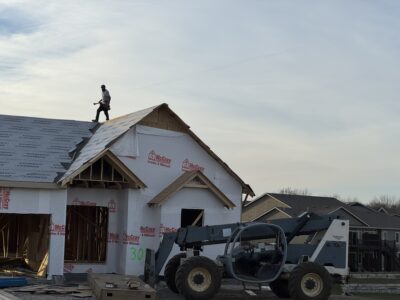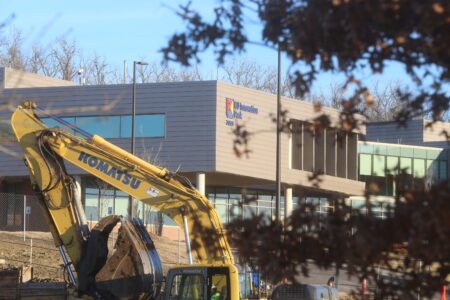
Local state legislator forms ‘smart gun’ company and sets up production facility in Baldwin City

photo by: Chad Lawhorn/Journal-World photo
State Sen. Tom Holland, D-Baldwin City, has formed a new smart gun company. The company uses RFID technology to equip a standard 9 millimeter handgun with a device that won't allow it to be fired unless it is in the hand of a specially equipped glove. The company, SmartGunz LLC, is opening a small production center in downtown Baldwin City.
As a state senator, Tom Holland has heard plenty of gun issues. Now, the Baldwin City Democrat is hoping to solve one: injury or death that happens when a gun falls into the wrong hands.
No, before you go there, this isn’t another gun control story about a new law or initiative. Instead, this is a business technology startup story. Holland and Lawrence attorney Brennan Fagan have started a new company that doesn’t aim to keep guns out of people’s hands, but rather hopes the gun in their hands will be a specially equipped “smart gun.”
“Our corporate mission is very simple,” Holland said. “Save lives of law enforcement and civilians.”
The duo has formed SmartGunz LLC and is in the process of opening a small production facility in downtown Baldwin City. The idea behind the company’s lone product is simple: A gun shouldn’t fire unless it is in the right hands.
To make sure that is the case, the company outfits a traditional 9 millimeter Colt 1911 handgun with RFID technology — the type of radio frequency tags that you often see attached to products in a warehouse so that managers can track their whereabouts.
SmartGunz takes those RFID tags and installs one into the handle of the Colt handgun and installs another into a black utility glove, the type you often see members of law enforcement wear. A patent-pending device that is installed on the handgun won’t allow it to fire unless the two RFID tags are in really close proximity, i.e., in the palm of your hand.
“You just hear far too many stories about kids hurting each other when they come across Dad’s loaded gun in the sock drawer,” said Holland, whose Senate district represents parts of Lawrence and portions of Douglas and Leavenworth counties. He has been in the Legislature since 2003 and was the Democratic nominee for governor in 2010.
You might think that type of gun owner is the prime customer for SmartGunz. Perhaps it will be someday, but the company is focusing most of its efforts on winning business in the law enforcement sector. Specifically, the company believes the smart guns would be a major safety enhancement for corrections officers — think prison guards or deputies at jails — who often have to transport inmates. You hear of stories where inmates overpower guards and gain control of their guns.
“We can prevent those types of tragedies,” Holland said.
The company also plans to sell the guns to civilians, although Holland is betting that the guy who already has a gun in the sock drawer won’t be the company’s best customer. Gun owners have strong beliefs about a lot of things, and a good portion of them may not think they need the added security layer.
“Who we really are targeting this to are civilians who are deathly afraid of guns,” Holland said.
He said he envisions there are people who can see the value of a gun for home protection, but simply have never bought one because they can’t stand the risk of an accidental shooting.
“We believe there is a vast civilian market that will be interested in it,” he said.
Holland became interested in smart guns after hearing a media report about them several years ago. There have been several manufacturing attempts, but most have focused on using fingerprint technology, which is a more complicated technology than the RFID tags, he said.
SmartGunz began taking pre-orders for its firearms on Thursday, with expected shipment to buyers in the fourth quarter of this year. Holland thinks SmartGunz is the only company currently selling a smart gun in North America. A quick check of the internet turned up other companies that are working on technology, but not much in the way of actual products for sale.
The internet also turned up several articles that highlight some of the past challenges of the industry. The traditional gun industry has been wary of the technology, in part because it believes the products are a first step toward outlawing traditional firearms. There also have been some reports of reliability problems with early models of smart guns.
However, several of those companies were seeking to build a handgun from scratch rather than using a widely produced model like the Colt 1911. Figuring out how to use an existing firearm was a key turning point for the company, Holland said. He gave outside consultants affiliated with Kansas’ two largest universities credit for helping the company navigate those hurdles.
The KU Small Business Development Center helped Holland — who also owns an IT company and a Douglas County winery — develop a business plan and conduct market research. But he turned to Kansas State University to help with the actual engineering prototype production. A team at K-State’s Technology Development Institute came up with the key pieces of technology for the product.
The next few months likely will provide the first glimpse at whether it is a technology breakthrough that captures the attention of the public. The company is selling the product — which includes the gun, the glove and a case — for $2,995 on its website, smartgunz.co, although it expects to have a lower price for law enforcement orders.
The price makes it about $1,500 to $2,000 higher than a normal 9 millimeter handgun.
“We’re out to determine if the market will place a premium on this safety feature,” Holland said. “There’s definitely law enforcement in certain quarters saying we can use this now. The real question mark will be the civilian interest in it. I personally think the market will be real receptive to it.”
•••
One other item of note from the SmartGunz startup is the space it is occupying in downtown Baldwin City. It is located in a small business incubator at 609 High St. that is a partnership between the city of Baldwin City and the Baldwin City Economic Development Corp.
The addition of Holland’s company now completely fills that facility, about one year after it opened. I mention it because while Lawrence has high-tech incubator space on KU’s West Campus, I sometimes hear the idea floated of an incubator in downtown Lawrence that would offer below-market-rent rates for a variety of retailers or service businesses that are just getting started.
Dave Hill, president of Baldwin City-based Mid America Bank and a member of the economic development corporation, said the incubator has been a hit in the Douglas County community of about 4,700 people.
“We have about two inquiries a month and no space,” Hill said of current interest levels.







